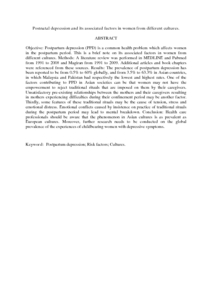Citation
Abdollahi, Fatemeh and Lye, Munn Sann and Md. Zain, Azhar and Shariff Ghazali, Sazlina and Zarghami, Mehran
(2011)
Postnatal depression and its associated factors in women from different cultures.
Iranian Journal of Psychiatry and Behavioral Sciences, 5 (2).
pp. 5-11.
ISSN 1735-8639; ESSN: 1735-9287
Abstract
Objective: Postpartum depression (PPD) is a common health problem which affects women in the postpartum period. This is a brief note on its associated factors in women from different cultures. Methods: A literature review was performed in MEDLINE and Pubmed from 1991 to 2008 and Magiran from 1991 to 2009. Additional articles and book chapters were referenced from these sources. Results: The prevalence of postpartum depression has been reported to be from 0.5% to 60% globally, and from 3.5% to 63.3% in Asian countries, in which Malaysia and Pakistan had respectively the lowest and highest rates. One of the factors contributing to PPD in Asian societies can be that women may not have the empowerment to reject traditional rituals that are imposed on them by their caregivers. Unsatisfactory pre-existing relationships between the mothers and their caregivers resulting in mothers experiencing difficulties during their confinement period may be another factor. Thirdly, some features of these traditional rituals may be the cause of tension, stress and emotional distress. Emotional conflicts caused by insistence on practice of traditional rituals during the postpartum period may lead to mental breakdown. Conclusion: Health care professionals should be aware that the phenomenon in Asian cultures is as prevalent as European cultures. Moreover, further research needs to be conducted on the global prevalence of the experiences of childbearing women with depressive symptoms.
Download File
![[img]](http://psasir.upm.edu.my/24671/1.hassmallThumbnailVersion/Postnatal%20depression%20and%20its%20associated%20factors%20in%20women%20from%20different%20cultures.pdf)  Preview |
|
PDF (Abstract)
Postnatal depression and its associated factors in women from different cultures.pdf
Download (85kB)
| Preview
|
|
Additional Metadata
Actions (login required)
 |
View Item |

